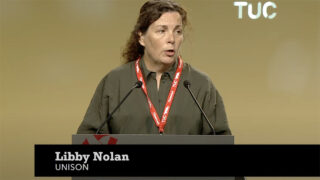Earlier this year I spoke in the Left Field tent at Glastonbury. I questioned how it could be that people in the sixth richest country in the world were becoming increasingly dependant on food banks. Six months on, and it is heartbreaking to be asking the same question in the lead up to Christmas.
This week’s report into hunger in the UK, which comes just days after George Osborne’s Autumn Statement, has given all of us a chilling projection of what five more years of a Tory government would look like.
A further five years of austerity, pay freezes, further cuts to public services and increasing prices. More reliance on welfare and food banks.
The government continues to live in denial at the crisis caused by its policies on pay, welfare and housing, to name a few. With the cost of basic foodstuffs going up by 35% over the past five years and home heating by 63%, it is not just those on welfare who are suffering. The freeze on wages and cuts to hours has fuelled a rise in the number of working poor, and the number of people resorting to food banks.
UNISON’s own welfare charity, There for You, has had more members turning to the union for financial support. Between 2011 and 2013, There for You saw a 75% increase in payments to members in crisis, many of whom could not afford to pay for food, bus fares or other daily essentials. In 2013, it paid out a total of £12,300, with individual payments starting from £20.
The report into hunger, launched by the Archbishop of Canterbury over the weekend, sets out a range of measures to tackle food poverty. But as the gulf between rich and poor continues to grow thanks to the Chancellor’s tax breaks for the wealthy, there is more that needs to be done.
For the past few years, UNISON has been highlighting the growing reliance on food banks and the scandal of hunger. We are campaigning to change the government’s welfare reforms so that vulnerable and low-paid families are lifted out of poverty. The Labour Party’s recent commitment to review universal credit, if elected, is a step in the right direction.
But what we desperately need is a government that understands that holding pay at such a low level that workers become eligible for in-work benefits is a completely false economy. A false economy in which taxpayers pick up the bill for in-work benefits caused by plummeting pay packets.
We need a government that commits to creating full-time jobs, paying a living wage across all public services, and increases funding for people in schools, colleges and further education, to help our next generation get ahead.
Five more years of this government simply does not bear thinking about.


